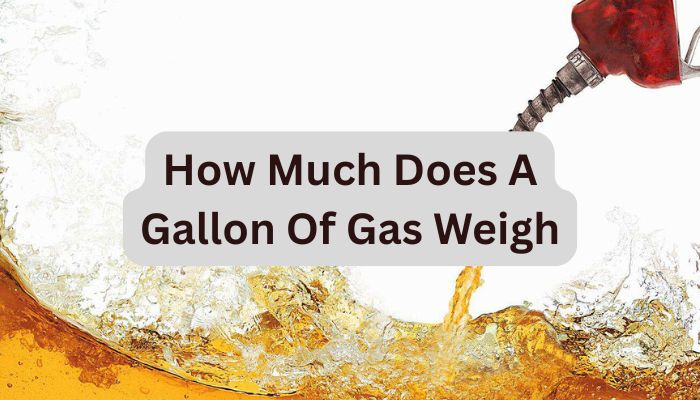When it comes to gasoline, most people are focused on fuel efficiency, octane ratings, and how far they can travel on a single tank. However, have you ever stopped to wonder how much a gallon of gas actually weighs? It’s a simple question, but understanding the weight of gasoline can reveal some surprising insights that affect not only your vehicle’s performance but also environmental impact and fuel logistics.
In this article, we’ll explore how much a gallon of gasoline weighs, the factors that influence its weight, and why this seemingly small detail matters more than you might think.
The Weight of Gasoline Explained
A typical U.S. gallon of regular unleaded gasoline weighs around 6 pounds at a temperature of 59°F (15°C). This weight can vary slightly based on the temperature and additives mixed into the gasoline.
While 6 pounds per gallon might seem insignificant, it’s crucial to understand that even small weight differences can add up over time, especially when you think about how much fuel is transported and consumed daily.
Comparison with Other Liquids:
Gasoline is much lighter compared to water, which weighs 8.34 pounds per gallon. This makes gasoline approximately 28% lighter than water. The difference in weight is one reason why gasoline is easier to transport and handle compared to liquids like water and diesel.

Factors Influencing Gasoline’s Weight
Gasoline’s weight isn’t fixed—it can fluctuate based on several factors. Understanding these factors helps explain why gasoline can weigh differently depending on the situation.
Temperature:
Temperature plays a big role in determining gasoline’s weight. Gasoline expands when heated and contracts when cooled. For example, a 30°F increase in temperature can cause gasoline to expand by approximately 3%. This means gasoline will be lighter in warmer climates and heavier in colder regions. If you’re filling up in a hot summer month, you may be getting slightly less fuel by weight than during the cooler months.

Additives:
The weight of gasoline can also change based on the types of additives it contains. Most gasoline today contains ethanol, which is mixed in varying amounts (such as E10, which contains 10% ethanol). These additives can influence the fuel’s density and, in turn, its weight. Premium fuels and other specially blended fuels might have slightly different weights due to these variations.
Impact on Vehicle Performance
The weight of gasoline doesn’t just affect how much you’re paying at the pump—it can also influence your vehicle’s performance in several subtle ways.
Fuel Economy:
While the weight of gasoline does impact the total weight your vehicle carries, the effect on fuel economy is relatively minimal. For instance, every 100 pounds of weight in a car can reduce fuel economy by about 1-2%. So, while the weight of the fuel might have a small impact on overall efficiency, it’s not something that will drastically change your vehicle’s miles per gallon (MPG).
Handling and Acceleration:
For high-performance vehicles, the weight of the fuel can slightly affect handling and acceleration. Gasoline’s weight impacts the car’s overall weight distribution. A full tank of gas raises the car’s center of gravity, which can have a small but noticeable effect on how the car handles turns and corners. Heavier vehicles, such as trucks, are less likely to be affected, but sports cars might feel a difference in handling with a full tank of fuel.
Gasoline vs. Diesel: A Weight Comparison
When it comes to comparing fuels, gasoline and diesel are often seen as two extremes. While they are both used to power vehicles, they have different densities and weights.
Diesel Fuel:
Diesel fuel is denser than gasoline, weighing about 7.1 pounds per gallon, making it approximately 14% heavier than gasoline. This increased weight is due to diesel’s more complex molecular structure, which contains more energy per gallon compared to gasoline.
Water:
Interestingly, water weighs more than both gasoline and diesel, clocking in at over 8 pounds per gallon. This is one of the reasons why gasoline and diesel are easier to transport and store than water in some contexts.
Calculating Gasoline Weight
For those curious about how to calculate the weight of gasoline accurately, here’s a simple formula to use:
Weight (lbs) = Volume (gallons) × 6.073
For example, 15 gallons of gasoline would weigh approximately 91.095 pounds. This formula can help you estimate the weight of gasoline you’re carrying or transporting, which can be useful for logistics or fuel management.
Environmental Considerations
The weight of gasoline isn’t the only thing you should consider. How gasoline interacts with the environment is an equally important factor.
Emissions:
Burning gasoline produces approximately 19.64 pounds of CO₂ per gallon. This is a significant environmental impact, especially when considering global fuel consumption. Fuels like E10, which contain ethanol, release slightly less CO₂ compared to traditional gasoline due to ethanol’s lower carbon content.
Spills and Leaks:
Gasoline is also a highly flammable and volatile substance. In the event of a spill or leak, gasoline can pose significant risks to the environment. Proper handling, storage, and disposal of gasoline are critical to preventing contamination of soil and water.
Fun Facts About Gasoline’s Weight
Here are some interesting and fun facts you may not have known about gasoline and its weight:
>>Historical Context: In the early days of the automotive industry, gasoline was much less refined and contained impurities, affecting its weight and energy content. Over the years, refining processes have improved, making modern gasoline lighter and more efficient.
>>Gasoline in Outer Space?: In 1965, NASA’s Gemini space missions used a special blend of fuel designed with weight and energy content in mind. This blend was used to ensure that the spacecraft could travel efficiently through space with the proper fuel weight.
>>Biofuels Influence: With the growing use of biofuels like ethanol, gasoline’s weight has become a bit more variable. E10 gasoline, which contains 10% ethanol, is slightly lighter than pure gasoline, as ethanol has a lower density than gasoline.
Conclusion: More Than Just a Liquid
While you may not think about the weight of gasoline every time you fill up your tank, it plays a role in everything from vehicle performance to environmental impact. Understanding the weight of gasoline can help you make more informed decisions about fuel and its effects on your vehicle and the planet.
So, the next time you’re at the pump, take a moment to consider how much that gallon of gas actually weighs. It’s a small detail, but it’s a significant one that influences a lot more than just your trip to the gas station.
